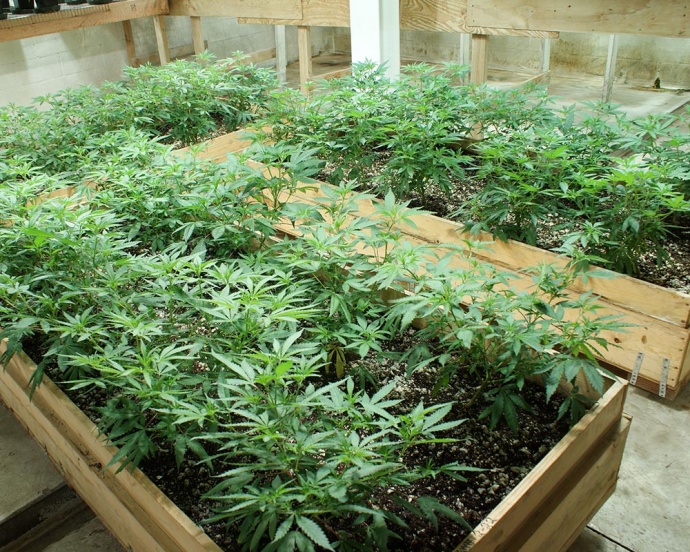Medical Marijuana Dispensary Bill Advances to Governor

Rep. Della Au Belatti (Makiki, Tantalus, Papakolea, McCully Pawaa, Manoa), who co-introduced the bill speaks on the House Floor. Courtesy photo.
By Wendy Osher
A bill that creates a statewide distribution system for medical marijuana passed out of the state House on the last day of session.
House bill 321 also establishes the parameters for individuals and entities to apply to set up the dispensaries.
House Speaker Joe Souki of Maui who co-introduced the bill said that while the legislature made medical marijuana use legal in 2000, the law remained silent for 15 years on how patients could obtain the product if they or their caregivers were unable to grow their own supply.
“There has been a desperate need for a safe and reliable dispensary system statewide for medical marijuana for a long time. This bill finally answers that need,” said Speaker Souki in a press release statement.

Rep. Della Au Belatti and House Speaker Joseph M. Souki co-introduced the bill. Both are long-time supporters of medical marijuana dispensaries. Courtesy photos Hawaiʻi State House.
The bill allows for eight dispensary licensees in the state: three on Oʻahu, two on the Big Island, two in Maui County, and one on Kauaʻi.
Under the bill, licensees may begin dispensing marijuana and manufactured marijuana products on July 15, 2016, with the approval of the Department of Health.
Rep. Della Au Belatti who joined Speaker Souki in introducing the bill said, “There are an estimated 13,000 qualifying patients throughout the state who are desperately looking to find a safe, reliable and convenient access to medical marijuana. This bill is a reasonable and compassionate response to the needs of our citizens.”
The measure now now goes to the Governor for his signature, veto or passage without his signature.
The measure was based on recommendations of a Task Force commissioned by the Legislature in 2013 to study the implementation of medical marijuana dispensaries.
House lawmakers provided a list of highlights of the bill which include the following:
- Each licensee may own, operate or subcontract up to two production centers and up to two retail dispensing locations; prohibits dispensary from being located in same place as production center;
- Requires the Department of Health to engage in public education and training regarding medical marijuana;
- Requires the Department of Health to adopt interim rules by Jan. 4, 2016, for the establishment and management of the medical marijuana dispensary system;
- Tasks the Department of Health with accepting applications for dispensary licenses from Jan. 12, 2016, to Jan. 29, 2016, and announcing licensees by April 15, 2016;
- Tasks the Department of Health to select licensees based on minimum requirements and merit based factors including: the capacity to meet the needs of patients; ability to comply with criminal background checks, inventory controls, and security requirements; ability to operate a business; and financial stability and access to financial resources;
- Allows the Department of Health to license additional operators after Oct. 1, 2017, based on qualifying patient need;
- Dispensaries must comply with all zoning regulations and will not be permitted within 750 ft. of a playground, public housing or school;
- Licensees may begin dispensing marijuana and manufactured marijuana products on July 15, 2016, with the approval of the Department of Health;
- Licensed applicants must pay (a) $5,000 non-refundable application fee, (b) an additional $75,000 fee for each license approved, and (c) a $50,000 annual renewal fee;
- Establishes the criteria for license applications to require that an individual applicant: be a legal resident of the State for not less than five years, be over the age of 21, and have no felony convictions;
- Establishes the minimum criteria for license applications to require that an entity applicant: be organized under the laws of the state and have a Hawaiʻi tax ID number, have a 51 percent or greater Hawaiʻi based ownership stake, have at least $1,000,000 under its control for each license applied for with an additional $100,000 available for each retail dispensing location;
- Imposes regular general excise taxes onto the sale of marijuana and manufactured products within the dispensary system and does not include any additional taxes;
- Allows qualifying patients to obtain medical marijuana from primary caregivers who cultivate or by personally cultivating marijuana until Dec. 31, 2018;
- Allows a primary caregiver or legal guardian to cultivate marijuana after Dec. 31, 2018, if qualifying patient is a minor or adult lacking legal capacity or who is located on any island with no dispensary;
- Expands the definition of “debilitating medical condition” for the purpose of authorizing use to include post-traumatic stress disorder;
- Expands the Department of Health’s authority to conduct criminal background checks;
- Requires dispensaries to allow announced and unlimited unannounced inspections and to conduct annual financial audits; and
- Requires the Department of Health to file annual report to Governor and Legislature on dispensaries.










